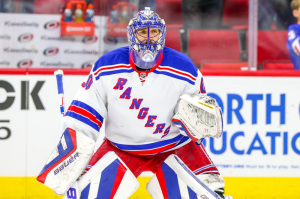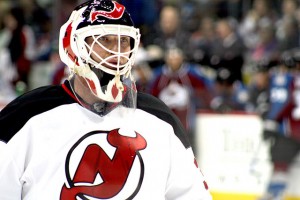Goaltending has been a hot button topic of discussion in these 2015 NHL Playoffs. In the early rounds, it was the heroics of Andrew Hammond and Devan Dubnyk. They both singlehandedly carried their teams to the playoffs with amazing stretches at the end of the regular season.
Now, even though they have carried their teams into the Conference Finals, three of the goaltenders have faced some degree of controversy (deserved or not). Frederik Andersen has been a rock, but the others have had their moments. Corey Crawford was pulled, then let up 6 goals, then sat before returning in the opening round against Nashville.

Henrik Lundqvist let up 6 goals in back to back games against the Lightning. As a result, some people thought it wasn’t out of the question to think Cam Talbot could start ahead of Lundqvist. Ben Bishop was pulled in Game 4 of the Eastern Conference semifinals.
This got me thinking: do you need an elite goalie to win in the playoffs?
Looking at the top paying goalies (a proxy for elite goalies), it appears that NHL GMs believe they are more important than other players on the roster. Looking at the top AAV contracts in the NHL, 13 of the top 72 contracts (at least $5.8M AAV) were signed by goalies.
Of the five positions, goaltending is tied for second most in the top 72 behind center (26), tied with defense (13), and ahead of LW (11) and RW (9).
Considering two defensemen are on the ice at all times, some may conclude from the above that GMs think quality goalies are two times as important as defensemen. Theoretically, if all positions were equal, there would be 12 centers, LWs, RWs, and goalies each, and 24 defensemen. Since that’s not the case, it’s clear that teams think elite goaltending is a key to success.
Do Elite Goalies Win in the Playoffs?

While regular season success is very important and can set your team up for a run in the playoffs, playoff performance is what really matters. I mentioned cap hit as a proxy for perceived quality, but it’s not a perfect indicator. There are plenty of overpaid (and underpaid) goalies, and cap hit can be determined by a number of things other than their actual quality of play.
Timing of negotiations, age, previous contracts, potential replacements within the organization, and availability of other free agents all can influence a goalie’s cap hit. So, when evaluating whether you need an elite goalie to win in the playoffs, we’ll use Vezina Trophy voting.
Vezina Trophy voting is unbiased because it is based on that season’s performance alone, and is (mostly) independent of reputation and the other factors that can influence cap hit.
The table below indicates how many playoff series Vezina Trophy finalists have won, going back to 2000-01 through 2014-15 (14 seasons).
Not what you expected? Me neither. The 42 best individual seasons by goaltenders over the past fourteen years have resulted in just 41 playoff series wins. Another way to look at this is that if your team’s goalie is a finalist for the Vezina Trophy, the most likely scenario for your team in the playoffs is to win your opening matchup, then get knocked out in the second round.
Do all Vezina finalists get knocked out in the second round? Or do many make long runs, and a few not make the playoffs at all, bringing down the average? Here’s the distribution of where they were knocked out of the playoffs:
The good news: if you have a Vezina Trophy finalist as your goalie, you’re almost guaranteed to make the playoffs (93% chance). The bad news? You have a 74% chance of being knocked out in the first or second round of the playoffs.
Only 8 of the 42 best performances by a goalies over the past fourteen seasons have resulted in trips to the Conference Finals (19%). 14.3% result in a trip to the Stanley Cup finals, and only 7% lead to that elusive Stanley Cup championship. The only three goalies to do it were Vezina winners Marty Brodeur (2002-03) and Tim Thomas (2010-11), and runner-up Jonathan Quick (2011-12).

But Bill, a sample size of only three goalies per season is pretty small, isn’t it? Yes, it sounds that way. But, by expanding the sample size of total goalies, you expose yourself to a different sample size issue: number of votes given to each goalie each year.
The goalie that finish 4th-6th in Vezina Trophy voting typically only have a few votes each, with the lion’s share going to the top three. That means a few votes to an undeserving player could really screw with the results. Thankfully, in this case, it only hammers home and reinforces my point.
Here are the same two tables that show the top six finishers in Vezina Trophy voting from 2000-01 to 2014-15 (81 total seasons, 4th-6th not yet available for 2014-15):
The finalists won a total of 41 playoff series during the period in question, and 4th-6th place won 39 playoff series.
The percentages look remarkably similar. You’re basically guaranteed to make the playoffs (94%), but most likely will be bounced in the first or second round (69%). The chances of making the Conference Finals improve slightly from 19% to 25%, but your odds of winning the Cup remain the same at 7%.
The Conclusion
Do you need an elite goalie to win the Stanley Cup? Absolutely not. All things being equal, you’re obviously better off having an elite goalie rather than not. However, the cost of having an elite goalie in terms of valuable salary cap dollars is almost always more than it’s worth.
There are too many good goaltenders in the world, and teams are better off paying less for a goalie that’s slightly worse than the elite. The marginal cost of acquiring an elite goalie is simply more than it’s worth. Teams are much better off spending their cap dollars on improving their forwards and defense, rather than throwing a mammoth contract at a goalie.



